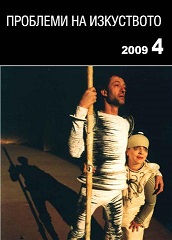Българският театър след 1989: реконструкции
BULGARIAN THEATRE AFTER 1989: RECONSTRUCTIONS
Author(s): Kamelia NikolovaSubject(s): Cultural history
Published by: Институт за изследване на изкуствата, Българска академия на науките
Summary/Abstract: The article describes and analyzes the development of the Bulgarian theatre after the political changes in 1989 . Two main periods could be defined during the last two decades – the period of the transition (1989-2007) and the period after 2007 when our country became a member of the EU . The first one is characterized by an extensive process of basic reforms, transforma- tions and innovations in different directions of the theatre life and it consists of two stages, delim- ited by the end of the 20 century. The second period has just started but its general characteristic are well visible – the theatre situation today is more stable and at the same time it is too conservative and unvaried . During the 90s the contemporary Bulgarian theatre experienced its most interesting and creative time. The first decade after 1989 brought the enthusiasm from the unlimited freedom . The theatre tried to test everything that had been missed or was forbidden during the previous years. Many new titles and playwrights, new theatre aesthetics, forms and styles, new names and companies appeared . The experiments ranged from innovative attempts and mixed practices in the psychological the- atre through dominant activities of the alternative theatre to different forms of the postmodern performance . The innovations began to fade away during the second stage of the transition period (late 90s–2006) . At that time the theatrical practice used mainly the discoveries of the 90s and mixed them with strategies of the conventional and popular scene . Most of the outstanding and creative events of this decade were cre- ated by a small number of people and companies, especially by few directors of the new generation, which appeared in the 90s . Today, in the first few years of the second period of Bulgarian theatre after 1989 the tendency to return to more secure and traditional theatre forms becomes stronger . The monotonous theatre land- scape shows very clearly that the situation of the transition period is exhausted and it needs actual and effective contemporary decisions and developments .
Journal: Проблеми на изкуството
- Issue Year: 2009
- Issue No: 4
- Page Range: 12-21
- Page Count: 10
- Language: Bulgarian
- Content File-PDF

